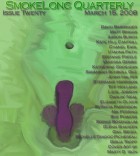Part of what makes this piece fun for me is the ambiguity of the characters’ ages. Though you provide hints—she wasn’t allowed to leave the backyard; Mamma’s garden hose—the age question is still open for interpretation.
The age of the characters, or what the reader believes those ages to be, is what informs their reading of the story. I was deliberately miserly with details, hoping, in the end, to force the reader to examine that gray area between play and harm, and then decide for themselves.
I love the image of the blanket of leaves fluttering, lifting, uncovering her piece by piece. It’s the pivot point of the story. Everything hinges on that one moment. Did the events unfold exactly as you’d envisioned them?
For the most part, yes. I needed that moment to be both sensuous and threatening. I hope I managed to pull that off.
The details of place are wonderful. The rusted Chevy, the church, the black dirt, the tin can, the flower garden under the window. Are they indicative of a certain place?
Those elements were pulled from childhood memories, but not from the same place or moment in time. I was trying to combine innocuous elements with more menacing ones to further erode that line between pleasure and pain
You also write poetry. What aspects of poetry writing cross-over into flash fiction?
I miss writing poetry. It helped me to craft better images (both in terms of power and subtlety), it forced me to write sparingly, and it taught me to listen carefully to the rhythm of words. Poetry and flash are not all that different. Some of my favourite flash writers have produced stories that read like prose poems.
While reading through the annual Kathy Fish Fellowship applications, I was struck by the number of writers who were using flash as, to paraphrase, a means to an end. Most people weren’t writing flash because they loved the form, because it took them places other types of fiction didn’t. Instead, they were using it as a gateway into longer works—short stories, short story collections, novels. As a champion of flash, I found this discouraging. Is flash fiction less satisfying, in terms of either writing or reading, than longer works? Or is it that the markets still haven’t accepted flash as a legitimate form? Why do you write flash, and where do you see it taking you?
The form is so portable, so accessible, I can’t understand why it has not yet achieved legitimacy among readers. I mean, who doesn’t have time to read a flash story? It is deliciously challenging and perhaps therein lies the problem. Many flash pieces require work on the part of the reader. They have to rely on their own imagination and sensibilities to decipher, conclude or resolve the action in a personally satisfying way. I find that delightful, but can understand why some readers might find that off-putting.



 The SmokeLong Grand Micro Contest (The Mikey) is now an annual competition celebrating and compensating the best micro fiction and nonfiction online.
The SmokeLong Grand Micro Contest (The Mikey) is now an annual competition celebrating and compensating the best micro fiction and nonfiction online.